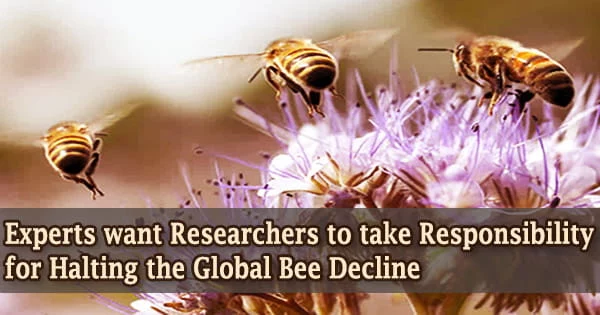“Insect and pollinator decline constitutes a pressing societal challenge that requires attention and action now. What is at stake is nothing less than the world’s ecosystems and food production,” says professor Jeroen van der Sluijs at the Centre for the Study of the Sciences and the Humanities, University of Bergen (UiB).
Van van Sluijs cites the Global Biodiversity Information Facility database, which reveals that wild bee biodiversity has fallen by 25% since 1990. Many plants rely on pollinators to develop seeds and proliferate, therefore this is a severe issue.
“The decline in bees and other pollinators continues with increasing strength, and we are running out of time,” he says.
In the scholarly journal Current Opinion in Insect Science, Van der Sluijs recently published an editorial and an article regarding bee decline.
Insect and pollinator decline constitutes a pressing societal challenge that requires attention and action now. What is at stake is nothing less than the world’s ecosystems and food production.
Professor Jeroen van der Sluijs
Safe pesticides not safe after all
The vast use of contemporary pesticides, according to Van van Sluijs and other experts, is to blame for the insect fall, which has slipped through the gaps in the otherwise strict European regulatory system.
According to van der Sluijs, there is a widespread belief that contemporary pesticides are far safer than previous generations. New research, including van der Sluijs’ own, links environmental pollution from contemporary pesticides including so-called neonicotinoids to a reduction in the populations of wild bees and other insects.
“One main reason why modern pesticides are not yet banned is that researchers have not taken enough responsibility for communicating the crucial expertise needed for governments and other decision-makers to make informed choices,” he says.
As a result, Van der Sluijs encourages scholars to take on more social duty and share their expertise, even if it isn’t always easy.
“Assuming one’s social responsibility as a scientist is always an uphill struggle. The academic reward system pushes you to prioritize scientific impact over societal impact,” he points out.
Encourages broad coalitions –
According to van der Sluijs, insect experts alone will not be able to stop the loss of the bee population. They must also form transdisciplinary coalitions with other society actors in order to bring previously overlooked important knowledge and early warning signals to the attention of decision-makers, as history has demonstrated.
“Independent researchers, beekeepers, conservationists and politicians formed a coalition to put alternative knowledge on the regulatory agenda. This initiative led to a pluralization of knowledge that contributed to remedying the blind spots of regulatory science,” says van der Sluijs.
Facts: Neonicotinoids
- Neonicotinoids are pesticides that are utilized as active ingredients in plant protection solutions to suppress hazardous insects.
- The term literally means “new nicotine-like insecticides.” They have a chemical structure that is comparable to nicotine.
- The name neonicotinoids is sometimes shortened to “neonics” or “NNIs”
- Neonics are insecticides that have a systemic effect. Systemic pesticides, unlike contact pesticides, are taken up by the plant and distributed throughout the plant (leaves, flowers, roots and stems, as well as pollen and nectar), rather than remaining on the surface of the treated sections of the plant (e.g. leaves)
- Insects’ central nervous systems are affected by neonics, resulting in paralysis and death.
- They’re also commonly used in veterinary applications including tick control and pet flea collars.





